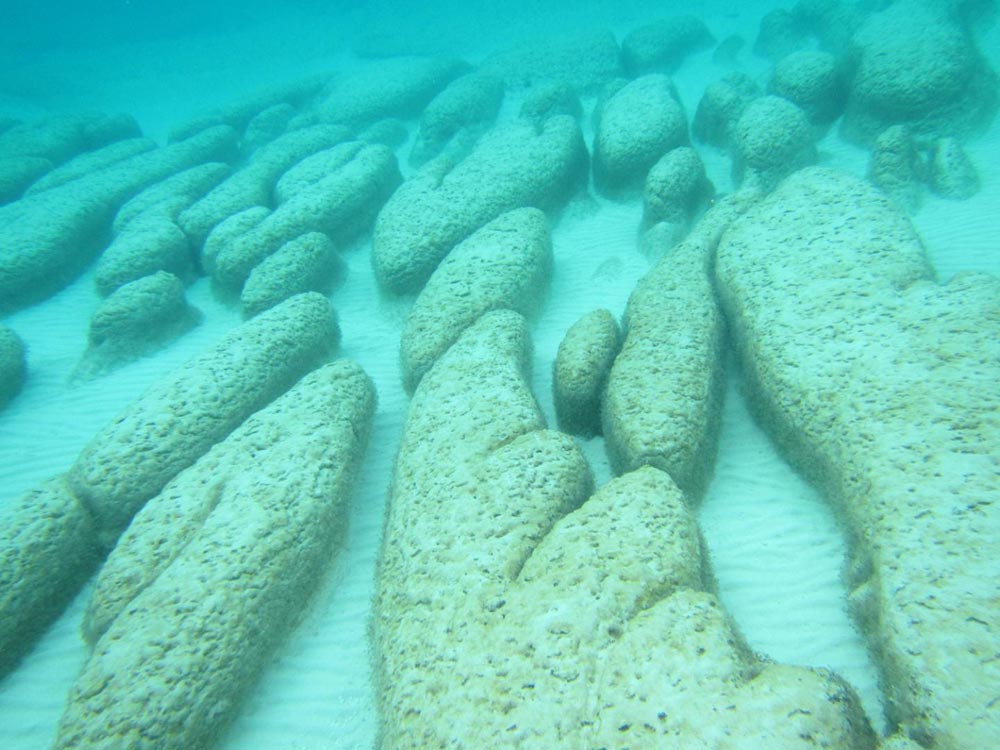

Elongate nested stromatolites, previously unknown in Hamelin Pool.
Credit: Pamela Reid, Ph.D., UM Rosenstiel School of Marine and Atmospheric Science
New research from a University of Miami (UM) Rosenstiel School of Marine and Atmospheric Science-led science team provides new insight into one of the world's most diverse and extensive ecosystems of living microbes. The study offers a new perspective on the growth and structure of rare, microbial reefs, called stromatolites, which are a window into the emergence and evolution of life on Earth.
The international research team spent three years collecting data to map one of the few living stromatolite communities in the world, located in Shark Bay in Western Australia. The map of stromatolites produced by the scientists from an area in Shark Bay, called Hamelin Pool, revealed eight distinct “stromatolite provinces,” each characterized by distinct morphological structures, many of which were previously unknown.
The results altered previous growth models for Shark Bay stromatolites and documented the importance of mineral precipitation in the formation of the stromatolite framework, a feature shared with Precambrian stromatolites that date back three billion years.
Stromatolites are buildups of limestone, similar to coral reefs, but formed by microbial mats. The activities of the microorganisms, particularly cyanobacteria, result in accretion of grains and precipitation of cements. Fossilized remains of stromatolites hold ancient records of early life for 75 percent of Earth's history. Stromatolite-forming microbes generated the oxygen in the atmosphere that allowed the evolution of higher organisms, including humans.
“The stromatolites in Shark Bay are a spectacular living laboratory that should be the best studied microbial system in the world,” said UM Rosenstiel School Professor of Marine Geosciences Pamela Reid, a co-author of the study.
Despite their abundance on early Earth, stromatolites are rare in the modern world and are not well understood. Modern stomatolites, such as those in Shark Bay in Western Australia, develop in extreme, high saline environments where animal grazing and competition with organisms such as corals and seaweeds are scarce.
“The time to study Shark Bay stromatolites is now as they are vulnerable to rising sea levels in the coming decades” said lead author Erica Suosaari, UM Rosenstiel School alumna and current research fellow. “Continued monitoring and detailed studies of the Shark Bay World Heritage site will be critical for management and conservation of this unique landscape, and will advance our understanding of early Earth.”
The new findings on morphological diversity, microbial communities, and mineral precipitation in living stromatolites in Shark Bay indicate the importance of this system as a window into early Earth, providing a basis for reconstructing ancient environments and understanding how microbial communities interacted with these environments.
###
The study, titled “New multi-scale perspectives on the stromatolites of Shark Bay, Western Australia,” was published in the Feb. 3 online edition of the Nature journal Scientific Reports. The study's authors include: Erica Suosaari, Pamela Reid, Paul Hagan and Gregor Eberli of the UM Rosenstiel School; Phillip Playford of the Geological Survey of Western Australia; Jamie Foster and Giorgio Casaburi of the University of Florida; John Stolz of Duquesne University in Pennsylvania; Ved Chirayath of the NASA Ames Research Center; Ian Macintrye of the Smithsonian Institution; and Noah Planavsky of Yale University. The study is available here: http://www.
About the University of Miami's Rosenstiel School
The University of Miami is one of the largest private research institutions in the southeastern United States. The University's mission is to provide quality education, attract and retain outstanding students, support the faculty and their research, and build an endowment for University initiatives. Founded in the 1940's, the Rosenstiel School of Marine & Atmospheric Science has grown into one of the world's premier marine and atmospheric research institutions. Offering dynamic interdisciplinary academics, the Rosenstiel School is dedicated to helping communities to better understand the planet, participating in the establishment of environmental policies, and aiding in the improvement of society and quality of life. For more information, visit: http://www.












